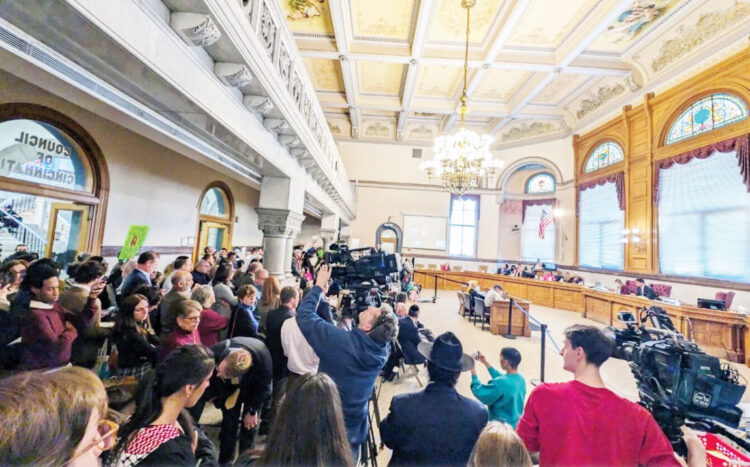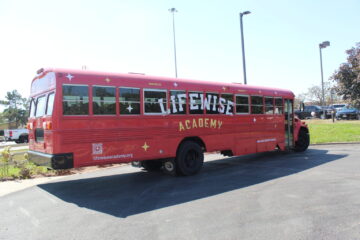Cincinnati mayor dismisses calls for cease-fire resolution

By Sam Fisher, cincyjewfolk.com
With an overflow crowd of more than 250 people packed into a Cincinnati City Council public forum on Feb. 14, Mayor Aftab Pureval said he did not believe the city should take up the cease-fire resolution many in attendance were calling for.
A standing-room crowd spilled out of the council chamber onto the marble staircase for the forum, which lasted more than four hours and over 100 people spoke for or against a possible cease-fire resolution on the war between Israel and Hamas which began after Oct 7, when Hamas attacked Israel, killed 1,200 Israelis, and took 250 hostages.
“Members of this council and myself have heard from the residents who have come before us and have worked with Jewish and Palestinian local leaders to draft a consensus language around the resolution that would speak for a unified voice in Cincinnati,” said Aftab after the public comment period.
“I hoped that we could get there, that we could find a collective message centered around peace, humanitarian support, and an end to the deaths of innocent civilians – particularly children. But it’s become clear that this time that consensus language doesn’t exist for an issue that is among the most nuanced and complicated in international affairs.
“When we have consensus, we will be here to listen and to engage. But at this time, I do not believe council should take a position.”
Since Oct 7 and the start of the Israel-Hamas war, numerous American cities have passed cease-fire resolutions calling on Israel to end its campaign in Gaza.
The high attendance at this meeting was to support a cease-fire resolution, which was never on the agenda. The cease-fire resolution was brought up on Feb. 7 by Council Member Meeka Owens.
At the same meeting on Feb. 7, council members Mark Jeffreys, Reggie Harris, and Seth Walsh put out a statement that a cease-fire agreement would further divide the Cincinnati community and be unbalanced.
“We, the undersigned, do not believe that we as Cincinnati City Council, can put forward a balanced and unified resolution on the war in Gaza. Instead, we are asking representatives for both communities impacted by this conflict, to discuss a path forward where both communities can have their voices heard. We hope such a dialogue can start to repair relationships in our city impacted by this horrible conflict.”
Hundreds of people spoke before the council. While the majority of those who addressed the council were respectful, some Palestinian activist’s comments veered into antisemitic tropes. Including an activist who exclaimed, “Jews are not indigenous to the region.”
The majority of the remarks remained peaceful. However, after some statements, the crowd cheered or booed and even quietly stated insults.
Many members of the Jewish community addressed the city council as well. According to Rabbi Ari Jun, director of the Jewish Community Relations Council, 170 members of the Jewish community registered to attend the public meeting with the JCRC.
Jeremy Spiegel, the assistant director of the JCRC, addressed council members about the massive increase in antisemitism since Oct. 7, claiming that a cease-fire resolution would further fan the flames of antisemitism. He shared some of the harrowing antisemitic incidents that have happened in Cincinnati since the start of the war.
“In schools, Jewish students have been confronted in hallways and told Hitler should’ve finished the job. Teachers tell their students that Jews have been killing for a long time,” Spiegel said. “Visibly Jewish teens are forced to leave the park after receiving death threats.
These are not isolated incidents, and they are not occurring in a vacuum. The words and rhetoric taken in this chamber have the power to heal or divide us at this pivotal moment.”
According to the ADL, between Oct. 7 and Dec. 7, antisemitic incidents in the United States rose 337% compared to the previous year.
Holocaust survivor and Israeli citizen Zahava Rendler spoke at the public forum. “I have to say this is the darkest time in our nation’s (Israel’s) history,” she said.
Several members of the Jewish community who spoke at the forum encouraged and welcomed the opening of a dialogue between the Palestinian and Jewish communities of Cincinnati.
“A cease-fire resolution does not solve this painful, complex international problem,” said Rabbi Moshe Smolkin. “We must begin an essential dialogue to repair wounded relations within our city.”
To read the complete March 2024 Dayton Jewish Observer, click here.





